social bookmarking tools:
 |
|
| Available RSS Feeds |
|---|
 - Top Picks - Top Picks |
 - Today's Music - Today's Music |
 - Editor's Blog - Editor's Blog
|
 - Articles - Articles
|
Add Louisville Music News' RSS Feed to Your Yahoo!
|
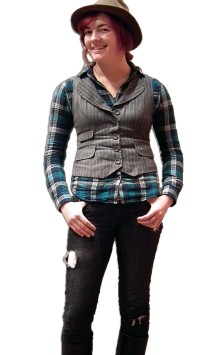
The Story of Alabama Brown
The story of Alabama Brown is just getting started – she is just 22, and her music career is only just beginning. However, she's seen enough in her short life to write some pretty in-your-face Americana songs, as evidenced by her debut EP The Reason I Stay, which came out in late 2011.
The four songs Brown recorded with her band the Inside Outlaws are filled with mischief, humor and – perhaps most importantly – a rattling sense of emotional honesty. When the band goes back into the studio this spring to record a full-length record, one can only wonder what stories lie in wait – especially if songs like "They Put My Baby in a Cage," a true story about a drunk-driving experience, provide any indication.
Meanwhile, Brown and her band cut their teeth around town, playing at venues like Uncle Slayton's and ZaZoo's, and eagerly waiting to see how the story unfolds. If manager Taylor Woods, who has taken over booking, promotion, recording plans, etc., has his way, Alabama's story will turn into one of the rags-to-riches variety.
When he took over as Brown's manager last year, he began booking shows (she had mostly played open-mic nights up to that point), recruited supporting musicians for the EP and live shows, and generally began to show Alabama the ropes. And he did it for free, which is a pretty good price for services like that.
Alabama Brown
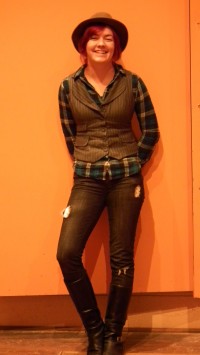
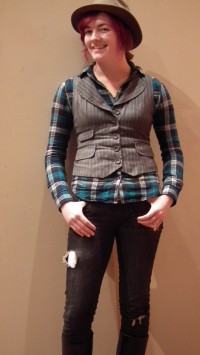

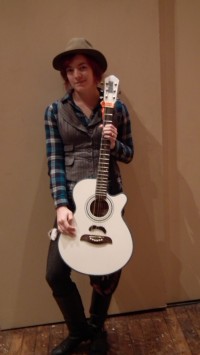


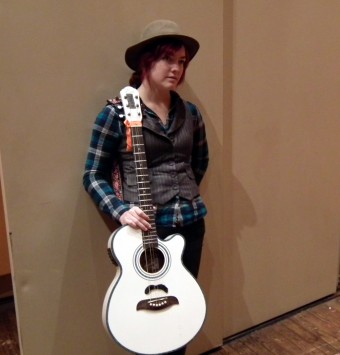

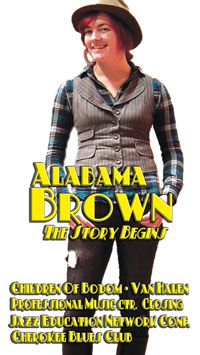
"Taylor got wind of what I was doing," Brown said. "He's always been my buddy, and he had approached me about managing me."
Actually, the story goes back a bit farther. Brown's mother was the former owner of Germantown Café, and Brown used to host open-mic nights there on Tuesday nights. Apparently, her mom liked what she heard, because she gave her daughter the gift of four studio hours at a small studio in Germantown operated by engineer Jared Hammond.
"I didn't even know what [four hours in a studio] meant," Brown said. "I had no idea what I was in for."
She decided to just go in and record a few songs acoustically to use as promos, maybe get some "real" gigs. But when she got started, "I realized what four hours meant." Which is to say, studio time is significantly shorter than real time when it comes to recording music. A three-minute country song can take hours and hours to complete in a studio session.
"I thought, 'This is relatively cheap, so I'm going to keep doing this,'" Brown said. When Taylor brought in the other musicians, it all came together. One of those musicians was fiddle player Emily Caudill, who now counts herself as an Inside Outlaw.
"I was really impressed," Caudill said of her first impression of Brown. "I thought that she had a good voice and was a great songwriter. She was writing material that isn't being played a lot in this area, but there's a big market for the kind of stuff she writes on the national scene."
"We ended up clicking really well," is how Brown put it. "That's how the Inside Outlaws came about."
FEELING HER WAY
If a basketball-loving kid who never seems to leave the gymnasium is called a "gym rat," then Brown is sort of an "open-mic rat." She admits that the Barret Bar is sort of a home away from home, and she enjoys visiting often to join in with whoever is playing, or to play a set herself.
She and her band have even been known to gather and play for a few beers. Hey, it's all about the music.. "It's like band practice with an audience," Brown said, and punctuated her observation with a smile.
But the truth is, Alabama Brown, the country-Americana crooner whose story is yet to be told, started out singing in her high school choir and playing piano. That's a far cry from the honky tonk fun on her EP.
She soon discovered that choir "wasn't really my thing," so she bailed on that and began writing original songs – on piano. At that point, she had no idea how to play a guitar, which creates a few barriers when you are interested in performing at open-mic nights.
"It's not a very portable instrument," she deadpanned. "The options to play are not out there." So she began to translate her knowledge of piano chords to the guitar, bringing her songs along with her in the process, and began plucking the strings better and better.
She acknowledged she's little more than a rhythm player at this point, but noted, "I can hold my own."
So here's the first turn in the story – Brown has about 50 songs in her unrecorded catalog, but they lay in wait until last year when she finally had the chops to play in bars. Enter the Germantown Café.
Now, here's the first plot twist: The guitar on which she learned belonged to her ex-husband. She had moved to Bardstown to live with him in his trailer, and there the transformation took place. "It was a very slow process, but it eventually ended up working out," she said. "I had friends who played guitar, who would teach me a chord a week."
It's only a plot twist because, well, one of the songs on The Reason I Stay was inspired by said ex-husband. And it's the title track. More on that later.
Another transformation also was taking place through all this. You see, Alabama Brown is not her real name – Brown's given name is Sydney Sleadd. Yeah, Sydney Sleadd and the Inside Outlaws doesn't have quite the same honky-tonk ring to it, does it?
Basically, when she got married, she decided if she was going to have to change her name, she might as well go all the way, and Alabama Brown was the choice she made.
Brown is the surname of her ex-husband, so that one isn't a mystery, but the "Alabama" part was very deliberate. "Alabama was from the movie "True Romance," my favorite character in any film."
The character in that 1993 Quentin Tarantino film, played by Patricia Arquette, was a prostitute who falls for Christian Slater's Clarence. Through the course of the film, Slater kills Alabama's pimp, which she considers one of the most romantic gestures imaginable.
Yes, this is a setup to talking about the subject matter of Alabama Brown's songs.
THE STORY BEHIND THE MUSIC
Brown's parents have obscure and interesting musical tastes. Her dad is into funk and jazz – Average White Band, Tower of Power, Little Feat – and her mom is into Joni Mitchell and Bonnie Raitt. But perhaps her grandmother was the one who most influenced Alabama Brown's music by force-feeding her granddaughter Patsy Cline and other classic country.
And now? Well, Brown is covering some of those songs she heard as a kid in her live shows.
"I used to hate when she made me listen to (country)," Brown said. "Now I'm so glad, because I know all the words to the songs already."
But what makes Brown's songs so very country, perhaps, is not necessarily how they are played but rather how the stories within the songs are told.
And now we return to "They Put My Baby in a Cage," which is about Brown's experience of getting pulled over while driving and insisting that the passenger of the car switch seats with her. Why? Because it was not her first offense. As you might guess from the song title, her co-pilot wound up in jail.
She had played a show at Diamonds that night and, she said "I had a lot of alcoholic beverages."
Unfortunately, it also turned out that the co-pilot had outstanding warrants, which, er, complicated the experience.
"I felt l like a jerk," Brown said. "I wrote the song so that he couldn't be mad at me. He was still in jail when I wrote it."
"Nobody Cares If I'm Blue," which is track two on the disc, is a cover of a 1920s tune by Annette Hanshaw which Brown always liked to sing "when I was nervous and stuff." She had tried to figure it out on piano, but couldn't, but when she picked up the guitar she altered the arrangement slightly and it became a staple.
"The jazz arrangement was infuriating," she admitted.
Next up is "Big Book," which about Brown's fall from the wagon.
"I had been in AA for a while and had quit drinking," she said. "I got my heart broke and started drinking again – temptation from the heartbreak."
She said it was written in the same time period as "Cage," which clearly was a rough time for Brown. "It was a mess," she said, laughing that it was her "summer of discontent."
"The Reason I Stay" is perhaps the most vulnerable and telling song on the EP. It is specifically about her relationship with her ex-husband, about which she talks as freely as she sings. The song is basically a self-aware exercise in trying to figure out one's own codependent dysfunction: "Some mornings you might kiss me on the forehead/Some nights you may sleep in my bed/But most of the time it don't seem like you're mine/No, we're only involved in my head."
"I was extremely upset at the time I wrote it," she said. "It was after one of our big fights, after the thing I did about once a week – weighing the pros and cons. More of, 'I'm afraid to be alone, but at the same time I'm miserable, so what do I do?'
She said getting married was something they did on a whim. "Things had been going good for a month, he was doing all the right things," she said. "And literally after two days of marriage, it went right back" to the ups and downs.
"It was a roller coaster-esque relationship, to say the least," Brown said.
She finally made the decision to break off the marriage last July. "Taylor joked that my next album should be called, The Reason I Finally Left," she said.
Those three originals were chosen for the EP because they were the first songs she had written, and therefore were the ones with which she felt most comfortable.
Caudill believes the songs slated for the next album are of the same quality.
"For her to be as young as she is, to write these songs about very mature subjects"' is remarkable, Caudill said. "I think they're just as strong. We get a really good crowd response when we play the other songs live."
Brown said there will be at least 10 songs on the next album, although a definite decision has not been made as to which ones. However, she said there are at least six that are non-negotiable.
NOW THE STORY REALLY BEGINS
In a sense, Brown is entering act two of her story. The back story is filled in, her motivations and challenges are known. So where does she see the band going in act two? That's a tricky question. Ironically, she said she would never strive to be famous because she likes her privacy. At the same time, she has the ability to spill her guts in a three-minute jangly country song.
When it comes right down to it, she has goals similar to those of most musicians. "I would like to be able to live comfortably off my music," she said.
She also wants to travel the U.S. She spent a summer living in Costa Rica and also lived in Ireland for a year, but she has never even been to New York. "One thing I haven't gotten the opportunity to do yet is tour," she said. "I want to play everywhere, travel around, play music and make that my career. That's pretty much my only goal."
Caudill said she would happily be along for the ride, if it came right down to it.
"Being a fiddle player, it's always fun to play that kind of country music," she said. "I would like to ride it out as long as possible. When I chose to be a musician, I decided I was going to do whatever I could to make a living doing what I love. Of course there is the element of fun, but at the same time, I hope we are able to sustain ourselves at least a little while."
Caudill noted that there is a large audience for alt-country in the U.S. Brown is well aware of that.
"We created a ReverbNation account, and they asked us to pick three bands we sound like," Brown said. The choices? Regina Spektor, Wilco and Loretta Lynne.
"Some of it is poppy and fun to dance to, and some of it is deep and lyrical," she said. "We [call it] Americana because it incorporates blues, soul, folk, all of it."
And while she has no illusions of becoming an icon like Loretta Lynne, she thinks of Steve Earle's career as a model to shoot for – Earle never achieved commercial fame, but he has a loyal contingency that has helped him sustain a career.
"As long as I pay the bills and make a couple people happy, I'm good," Brown said.
It will be interesting to see how the story unfolds.
